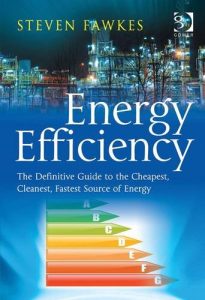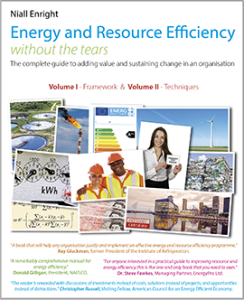 I have been looking forward to reading Steven Fawkes’ “Energy Efficiency – The Definitive Guide to the Cheapest, Cleanest, Fastest Source of Energy“, ever since I heard on his blog that it was about to be published. I have enjoyed reading Steven’s blog for some time now and I regret that I only just missed working with him advising on the new Energy Efficiency Deployment Office here in the UK a couple of years ago – there were three positions and I was fourth on the list! Cest la vie!
I have been looking forward to reading Steven Fawkes’ “Energy Efficiency – The Definitive Guide to the Cheapest, Cleanest, Fastest Source of Energy“, ever since I heard on his blog that it was about to be published. I have enjoyed reading Steven’s blog for some time now and I regret that I only just missed working with him advising on the new Energy Efficiency Deployment Office here in the UK a couple of years ago – there were three positions and I was fourth on the list! Cest la vie!
Certainly I find myself in violent agreement with much of Steven’s observations. For example he starts the chapter on Management Techniques thus: “It is about Management, Not Technology. The process of improving energy productivity is not a technical problem. It is a management process“. This is sweet music to my ears.
This easy, straightforward style makes Energy Efficiency a highly readable book. As Steven states at the outset: “This book is broad in scope rather than deep in any one aspect“, and it certainly lives up to that promise. For someone new to the extensive landscape of energy efficiency issues this is an absolutely perfect primer (in fact I know a couple of folks studying Masters who I will definitely recommend this book to).
The scope is comprehensive, spanning a dizzying array of topics from the definition of energy efficiency through, barriers, technology, motivation, organisation, finance, innovation and policy. It is a thoroughly credible sampler of all the key issues in energy efficiency, written by someone who has clearly experienced many of these challenges personally, with a refreshingly international perspective, very much up-to date and authoritative. If the initial exposition of a theme leaves you wanting more, then the very extensive references and bibliography at the end of each section will enable the reader to continue their learning.
There were a few chapters that I particularly enjoyed. For example the history of the US Energy Services Companies market was very interesting as I also spent a considerable time working in this area in the late ’90s and early ’00s, figuring out why some aspects, such as the success of the business model in the public sector, were not translating to the private sector even where payback were very short. It is the combination of a historic view and lessons learned, with the contemporary challenges that make this book stand out from the crowd.
Another chapter I enjoyed was about the Jevon’s effect (aka the Khazzoom-Brookes postulate). This, in simple terms, states that energy efficiency savings are inevitably less than expected because the money saved is re-invested in activities that increase the consumption of energy. For example, a homeowner who sees their electricity bills come down may go out and buy a second TV, thus partially offsetting the improvement. There is no doubt that this effect exists – the only argument is as to the degree. Steven explains the evidence for and against the significance of this effect in a balanced way, and concludes with a common-sense observation that even if this is a material effect, it doesn’t invalidate the benefits that we can derive from energy efficiency.
In fact it is in his even-handedness that I find my only real disagreement with Steven, where he states: “Whether or not climate change is driven predominantly by anthropogenic [human-caused] carbon dioxide emissions remains controversial“… and later… “Reducing energy use reduces carbon emissions… The value of this benefit depends on your view on climate change and whether or not it is primarily caused by man-made emissions of carbon dioxide“.
It feels strange to be reading this in same week as the release of the fifth IPCC report in which scientific certainty about anthropogenic climate change has increased even further. As a statement of fact no one would argue that there is indeed a controversy, i.e. “prolonged public disagreement or heated discussion” (Oxford English Dictionary), around climate change. We need to remind ourselves that the presence of debate is not in itself indicative of whether the science is correct or not – heck if that is the case then we should be accepting that creationism might be true! At this moment in time the scientists on the IPCC are unequivocal: “This evidence for human influence has grown since AR4 [their last report in 2007]. It is extremely likely that human influence has been the dominant cause of the observed warming since the mid-20th century.”… and… “Continued emissions of greenhouse gases will cause further warming and changes in all components of the climate system. Limiting climate change will require substantial and sustained reductions of greenhouse gas emissions“.
Not being a climate scientist myself, I accept the view of the IPCC, although I will, of course remain open to change my opinion if the evidence changes. In the meantime the Precautionary Principle says that the wisest course of action, in the absence of absolute certainty, is to proceed as if the risks are real. An interesting piece by the Guardian explains why the notion of “controversy” is being used by conservative media to distort the overwhelming consensus amongst climate scientists (97%) that CO2 is indeed the primary cause of climate change, which may also explain my hypersensitivity to this word.
I do hope I am not coming across as a nit-picker. These are after all just a few words in a 250 page book. The reason why I feel that this matters is that, despite the many good financial reasons for improving energy efficiency that Steven sets out in his book, and which he and I fully agree on, for many organisations energy is simply too small an input cost for the financial benefits, though real, to drive deep and sustained change.
The acknowledgement that carbon does matter changes the dynamic of the debate on energy efficiency in a plethora of ways – causing us to consider that there is such a thing as “good” energy obtained from renewable sources, as well as “bad” energy which increases atmospheric CO2. It changes the merit order of energy efficiency based not just on the return on investment and the quantum of saving but also on the impact on emissions. It means that we may have justifications to intervene in the market in order to modify the rate of return that investors achieve from different forms of energy efficiency, rather than follow a laissez-faire approach. In essence there are three characteristics that we need to achieve with any energy supply: it needs to be cheap (affordable), plentiful (secure) and clean (low carbon). Energy Efficiency argues eloquently for the first two categories of benefit but less so for the third.
That having been said, the argument for energy efficiency is nevertheless compellingly set out. We are left in no doubt that it really is the “Cheapest, Cleanest, and Fastest Source of Energy”. An important strand throughout the book is the need for energy efficiency be treated as a resource on exactly the same terms as energy generation – that there is no difference between a kiloWatt-hour of energy generated and a “negaWatt-hour” of energy saved. The reasons why investments in energy efficiency require a much higher return than the same investments in energy generation are fully explained. The two “Elephants in the Room” from a policy perspective are fossil fuel subsidies and the challenge to engage the electricity sector in delivering efficiency (rather than selling more electrons or building more infrastructure). In terms of an introduction to policy this is first-class.
If this all sounds very dry – don’t be put off. The style of writing is very good and the content is peppered with interesting and thought provoking facts which lift the serious messages. I leaned, much to my amusement having been involved in recent discussions on the merits of installing electric vehicle charging points vs. the relatively small number of electric vehicles, that: “in 1900, 40 percent of cars were steam, 38 percent electric and 22 percent gasoline, and in 1899 and 1900 electric cars outsold gasoline and steam cars. In 1900 Ferdinand Porsche developed the first fully functioning hybrid car and, interestingly, New York had battery swapping stations in 1910“. Steven Fawkes’ involvement in advising investors in the energy and clean technology sectors makes for a fascinating reprise of the some the emerging technologies for energy efficiency. For example I had not heard of buildings providing DC microgrids which would eliminate most of the conversion losses associated with transformers on computers, chargers and some types of lights, and even allow the DC supply from Solar PV to be exploited directly rather than sent to an inverter with the resultant losses converting to AC.
Steven concludes “on balance I am optimistic” and I can see why. There is much in this book that demonstrates that we do have the potential to innovate, organise ourselves and release the necessary resources to achieve a deep and sustained transformation in our use of energy. What is needed above all is will, coupled with the an ability to take on board the lessons of history. There really is no reason why we cannot significantly improve on the 11% of primary energy that we consume today which delivers a useful service.
All in all a thoroughly recommended read – and a must have for those studying the topic.
Further reading
Steven Fawkes’ has a great blog called “Only Eleven Percent” which I thoroughly recommend (also see list of blogs to the right)
| KEY Usefulness: how will this book support a resource efficiency practitioner? Does the book give real-world examples and tools? Are reference to other sources of information well documented. Is it an objective and credible source? Relevance: how widely applicable is this book in delivering practical resource efficiency? Is it only for a narrow niche or are the concepts widely applicable? Are there good, contemporary examples of best practice? Accessibility: how well written and structured is the book? Is there an assumption about prior knowledge? Value for money: Taking into account the other parameters is this book a good investment? Overall: The average of the previous ratings. IMHO= in my humble opinion. Please post a response to the review if you feel I have got this wrong! |
Check out all the book reviews on this site.
Learn what an effective resource efficiency framework looks like.
Read other articles and posts on energy and resource efficiency issues.
Or learn how SustainSuccess services can drive improvement in your organisation.



0 Comments